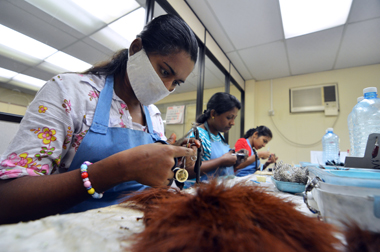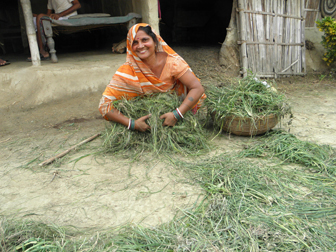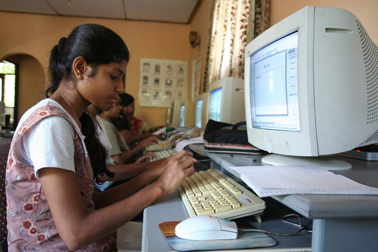Huge gender pay gap in South Asia
Women in South Asian countries earn 80% less than their male counterparts, an
ActionAid study has found.
The study also reveals that inequalities of all kinds are on the rise. This is
happening despite the fact that the moral, political and economic justifications
for such inequalities - whether between women and men, between Dalit and
Brahmin, or between black and white - are increasingly being challenged.
 ActionAid, an international NGO working against poverty and injustice, published
the findings in a report titled “The Price of Privilege: Extreme wealth,
unaccountable power and the fight for equality in the 21st century.” ActionAid, an international NGO working against poverty and injustice, published
the findings in a report titled “The Price of Privilege: Extreme wealth,
unaccountable power and the fight for equality in the 21st century.”
The study was based on work experiences in 45 countries and information from
around the world. The study finds that women in Sub-Saharan Africa and South
Asia earn 80% less than men.
Healthcare
Also, women from 32 countries contribute as much as $3 trillion in labour value
to global healthcare in 2010, nearly half of it unpaid, the report states.
It recommends that women’s unpaid care burden should be redistributed and
reduced.
This issue is especially important for Bangladesh where ActionAid says women
spend six hours to do unpaid care work each day compared to only one hour spent
by a man.
The richest 1% of the global population now control over half of the global
wealth, while the poorer half of the world control less than 1% of wealth, the
report says. The combined wealth of the 200 richest people in the world - $3.18
trillion - is greater than the total wealth of Africa - $2.83 trillion - and
nearly equivalent to the total wealth of Brazil – $3.194 trillion. According to
the report, the richest 64 individuals control as much wealth as the poorest 3.5
billion people combined.
Inequality
“When so many of the world’s resources are controlled by so few, we cannot talk
about poverty and inequality without also talking about extreme wealth,
consumption patterns and elite capture of power,” said Farah Kabir, country
director of ActionAid Bangladesh.
 All governments have now promised to act on inequality but almost all were
failing to walk the talk. The power of money was ripping societies apart, she
added. Countries like Bangladesh should focus on creating more and better jobs
and ensuring that the rich paid their fair share as a way to pay for social
protections for the poor and vulnerable communities, said Farah. All governments have now promised to act on inequality but almost all were
failing to walk the talk. The power of money was ripping societies apart, she
added. Countries like Bangladesh should focus on creating more and better jobs
and ensuring that the rich paid their fair share as a way to pay for social
protections for the poor and vulnerable communities, said Farah.
The ActionAid report also identifies a range of policy solutions that would
decrease inequality by redistributing power and wealth in societies, including
innovative solutions such as a maximum wage and better recognition and
compensation for women’s unpaid care work.
Interconnections
The report further addresses the range of inequalities and the interconnections
between them – especially how inequalities of gender and ethnicity intersected
with inequalities of wealth.
According to another report, Women in Asia seem to be having a hard time in
their workplace. Promoting their achievements and accomplishments seems to be a
daunting task, according to Hays 2016 Gender Diversity Report.
The recruiting firm surveyed about 1,500 people globally. According to the
findings, 47% of women feel they can promote themselves in their workplace.
Of the 1,183 respondents across Asia, only 38% said they have the opportunity to
self-promote.
In Asian countries, Malaysian and Chinese women were most comfortable in
promoting their accomplishments with 42% saying they felt they are able to
showcase their achievements.
They were followed by Singapore at 36% and trailing behind were Japanese women
at 35%.
 “Women in Asia are traditionally more reserved in the workplace, due to cultural
preconceptions of a woman’s role in society, and compared to men, are less
likely to ask for a pay rise or a promotion” says Christine Wright, MD, Hays
Asia. “Women in Asia are traditionally more reserved in the workplace, due to cultural
preconceptions of a woman’s role in society, and compared to men, are less
likely to ask for a pay rise or a promotion” says Christine Wright, MD, Hays
Asia.
Women also have differing priorities than men at certain stages of their lives,
and many opt to put their career on the back-burner to raise a family.
Confidence
“Employers have a role to play in fostering the confidence of their female
workforce by opening channels of communication for them to promote themselves.
Employers also need to ensure that the top jobs in their organisation are
attractive to women.
Women don’t necessarily crave the power that comes with a top job title like men
do,” says Wright. In addition, flexible working practices are considered by
Asian respondents in the survey to be the most effective measure in improving
gender diversity in the workplace.
Employers should take practical measures to encourage more women to continue
work even after having children.
The summary of the findings from the report will be presented at the Hays Japan
diversity event taking place in June.
(Dhaka Tribune, Asia Times).
|

